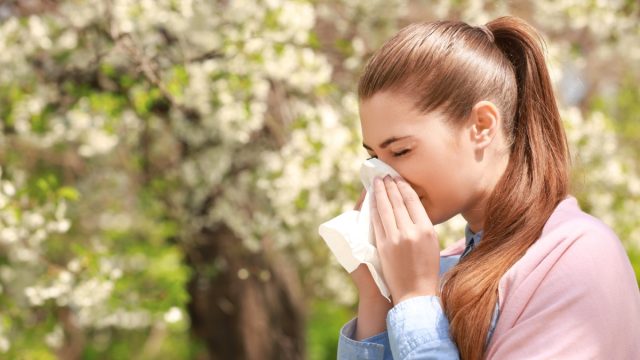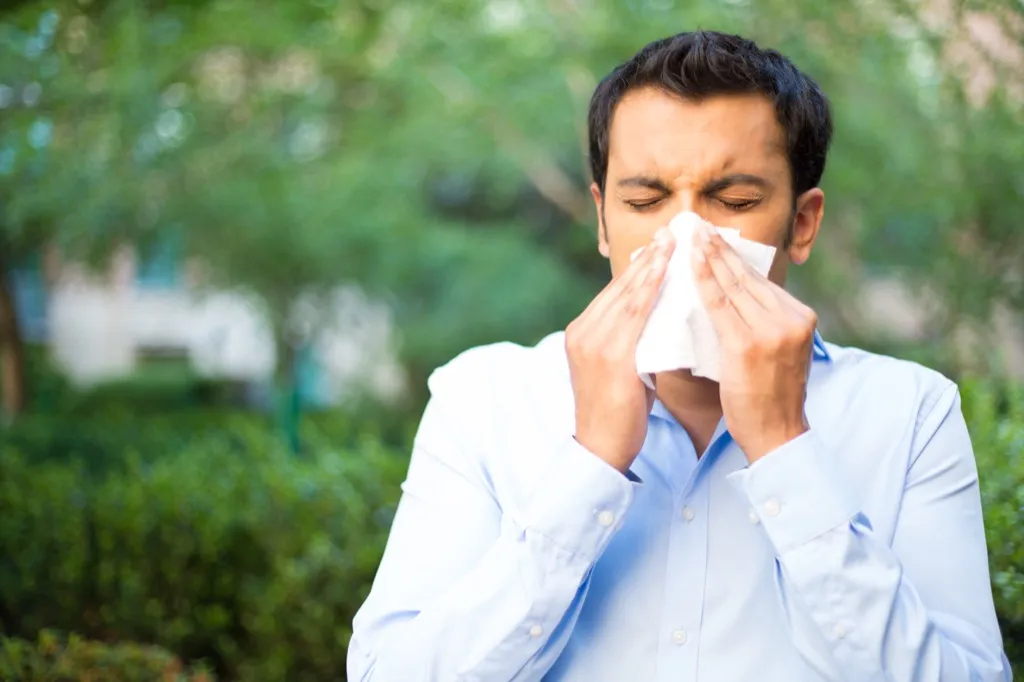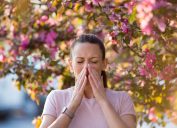Yes, Your Allergies Are Worse This Year—Here's Why
Experts say environmental changes are to blame.

Have you been sniffling and sneezing more than usual this spring? You're not the only one. According to the Centers for Disease Control (CDC), 30 percent of the world's population suffers from pollen allergies, which cause symptoms of hay fever or allergic rhinitis. And if you feel like your allergies have gotten worse as of late, you're not imagining it: Since 1990, researchers have noted a 21 percent increase in the amount of pollen in the air.
Best Life reached out to Shyam Joshi, MD, Section Chief of Allergy and Immunology and Medical Director of the Allergy and Immunology Clinic at Oregon Health and Science University, to find out what's behind that change. He says a few key factors are driving the increase in allergies—and notes that there are ways to fight back against your symptoms. Read on to learn why your allergies are worse this year, and what you can do about it.
READ THIS NEXT: 5 Common OTC Medications Pharmacists Wish You'd Stop Taking.
Here's why your allergies are worse this year.

Joshi says the main cause of increased allergies is climate change. "Over the past few decades, climate change has led to longer pollination seasons and higher pollen counts. This is mainly due to a decreased number of days with frost each winter and an increase in CO2 in the air, which leads to a more robust pollination cycle for plants," he tells Best Life. The largest increases in pollen counts were observed in Texas and the midwest region of the United States, adds Jennifer Bourgeois, PharmD, Pharmacy and Medical Expert at SingleCare.
In fact, a 2022 study published in the journal Nature Communications found that in addition to the changes brought on by CO2 emissions, changes in temperature and precipitation can increase annual pollen emissions by 16 to 40 percent. Additionally, land cover change—meaning the transformation of natural habitats to urban environments—also modifies the distribution of pollen emitters, the researchers say.
READ THIS NEXT: Taking This Supplement Can Cut Your Pain in Half, Experts Say.
Your body may also be driving the change.

Joshi adds that besides environmental changes which make allergies more likely, your body may also be increasingly susceptible to allergies.
"While the underlying cause is not completely understood, it is thought that changes in one's diet and microbiome may be contributing factors," he says. "This taken together likely explains why many people are experiencing more prominent allergy symptoms year after year."
For more health news sent directly to your inbox, sign up for our daily newsletter.
Allergy season is also getting longer.

If your allergies seem especially insufferable this year, that may also be due to the fact that allergy season now lasts longer.
"With warmer weather, the last frost of the year is occurring earlier in the year, which allows plants more time to pollinate," says Joshi, pointing to a USDA-funded report which shows that the pollen season in North America now starts about 20 days earlier and can last 10 days longer.
People are noticing the difference. According to a recent SingleCare survey released in Mar. 2023, more than half of individuals surveyed said they had already experienced springtime allergies by that time in the season. Seventy-one percent said that this marked an earlier start than usual for their allergy symptoms.
Here's how to soothe your symptoms.

Seasonal allergies can deeply affect your quality of life, depending on the type and severity of your symptoms. "Beyond the itchiness, sneezing, and runny nose, it has also been associated with fatigue, coughing, wheezing, and higher rates of depression and anxiety," says Joshi, who is also the Chief Medical Officer for Nectar.
However, he notes that several treatments are available to help better manage your symptoms, including intranasal steroid sprays, oral antihistamines, and antihistamine eye drops. He adds that allergen immunotherapy in the form of allergy drops or allergy shots can also help reduce one's sensitization to environmental allergens. "The goal is to develop tolerance and not develop any symptoms when exposed to these substances. While there is a notable time commitment to immunotherapy, they can provide long-term relief and reduce the dependence of medications."
Finally, there are a handful of lifestyle habits that may help you better endure allergy season. Joshi recommends avoiding the outdoors during peak pollen periods, keeping windows and doors closed, using a HEPA-rated air purifier in each room, and washing your hands and face when coming into the house to remove any pollen. Speak with your doctor to learn more about how to treat allergy symptoms.
Best Life offers the most up-to-date information from top experts, new research, and health agencies, but our content is not meant to be a substitute for professional guidance. When it comes to the medication you're taking or any other health questions you have, always consult your healthcare provider directly.





















